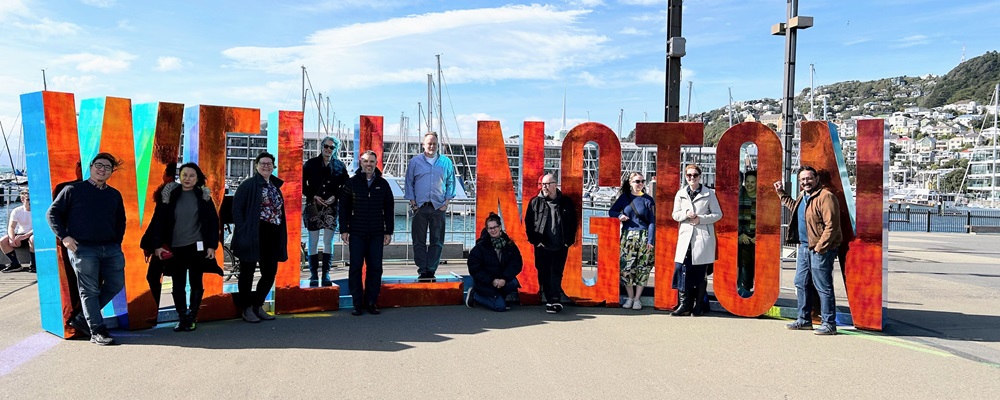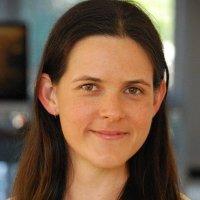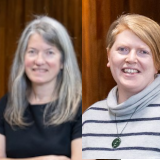Blog
Unless otherwise stated, content is shared under CC-BY-NC Licence
NFSA Technical Specifications for Preservation Digitisation
Jaye Weatherburn is Head of Digital Preservation at the National Film and Sound Archive of Australia (NFSA)
As the trusted custodian of Australia’s audiovisual heritage, the National Film and Sound Archive of Australia (NFSA) actively advises on technical specifications and implements policies and procedures that contribute to good practice across the international GLAMR (Galleries, Libraries, Archives, Museums and Research) sector.
We recognise that evolving technology is integral to the digital expansion of audiovisual archives, from the 1930s to the present. Our approach to selecting, reviewing and implementing digital object formats is undertaken in accordance with in-house operations which reflect current archival and industry standards.
Review, Understand, Implement: Planning for Digital Preservation by taking Inventory
Jack Wain is Coordinator, Digitisation and Preservation at Deakin University Library
University collections come in many shapes, formats and sizes, and typically involve a large variety of interconnected systems, discovery platforms and repositories, often accrued and integrated over many years – even decades. These systems will also often have their own data analysis tools or reporting functions, or have integrations set-up for this task, and as a result it can sometimes be difficult to grasp the sheer volume of digital files in the entirety of a collection because your data points are gathered separately. This is even further complicated in situations where ownership or responsibility for the collections varies, or in cases where documentation has been developed independently by numerous teams.
Australia: Doing our part to avert the digital dark ages
Cynde Moya, Postdoctoral Fellow at Swinburne University of Technology
For World Digital Preservation Day we are thrilled to announce that our ARC LIEF (Australian Research Council - Linkage Infrastructure, Equipment and Facilities) application "The Australian Emulation Network Phase 2 - Extending the Reach" has been funded.
The importance of Preserving Archival Material for Community through Digitisation
Amie Martin (Gamilaroi) and Gulwanyang Moran (Birrbay & Dhanggati) of the First Nations Community Access to Archives project at the Museums of History New South Wales
Under Article 13.1 United Nations Declaration of the Rights of Indigenous Peoples
Aboriginal peoples have a right to be self-determining in relation to their Languages, Knowledges and Cultures.
The importance of accessing archival materials is fundamental to not only language revitalisation but to connect First Nations people back to ancestors, reclaim cultural practices and shed our own light and shadows over the information found in colonial records. Further, there is a truth-telling connection to historic injustice, bridging a gap to connections thought to be lost.
Archives hold a power, a power over accessibility, over the impact of records on First Nations peoples and narratives, allowing them to explore past histories.
While these archives cast a dominating white shadow, they also trace another history. This invisible history can be seen through the almost breathtakingly complete absence of our voices within these spaces and texts. There are glimmers and whispers and we can read through their colonising archival lies. This is a history that we can collectively give life to; our Nunga histories of creative resistance, our histories of collective love transforming abjection, and our histories that are deeply engaged in survival. We cast our own shadows. We shed our own light; it can be found shining in the midst of oppressive times. - Baker et al. 2020, p 856.
Finding community on the other side of the world
Nicola Caldwell is a Digital Archivist at the National Library of New Zealand
DigiPres folk are some of the most generous and welcoming colleagues I have had the pleasure of meeting. As an early career professional from Aotearoa New Zealand, I have found a passionate and supportive network in the field of digital preservation. This sense of community is something I have felt both at home in Australasia and, more recently, during my travels in Europe. Earlier this year, I had the privilege of meeting colleagues in the UK, Ireland, and the Netherlands, thanks to the support of my managers, during some personal travel.
As a digital archivist at the National Library of New Zealand, I care for incoming unpublished born-digital heritage collections, carrying out transfer, technical appraisal and ingest. In my first two years in the role, I have learned about everything from obsolete technologies and hardware to collecting social media. I have also developed an avid interest in the preservation of complex digital objects such as games and time-based media art. On my travels, I was keen to find out how colleagues in Europe were tackling digital preservation challenges and to expand my knowledge of the tools, frameworks and processes used in the profession.
Shaping iPRES 2025 Together: Celebrating Community in Aotearoa New Zealand and Beyond
Andrea Goethals is Manager, Digital Preservation and Data Capability at Te Puna Mātauranga o Aotearoa National Library of New Zealand, and Conference Chair for iPRES 2025 in Te Whanganui-a-Tara Wellington. Valerie Love is Senior Digital Archivist and Acting Digital Collections Team Leader at the Alexander Turnbull Library, the Archives and Special Collections for Te Puna Mātauranga o Aotearoa National Library of New Zealand. They are one of the Co-Chairs for iPRES 2025.
Nau mai, haere mai and hello from Aotearoa New Zealand, the first place in the world to see the sun. We could not be more delighted to kick off World Digital Preservation Day 2024! This year’s theme, Preserving Our Digital Content: Celebrating Communities feels particularly relevant in the lead up to iPRES 2025, which will be held in Te Whanganui-a-Tara Wellington, Aotearoa New Zealand.
As part of our preparation, we’ll be hosting a series of ‘Call to Community’ online workshops over the coming months to gather your ideas on what the ideal iPRES conference experience could look like. These workshops will be a chance for the digital preservation community to shape the conference's focus and activities together, ensuring it reflects the community's evolving needs and aspirations. We can’t wait to hear from you!
The Wellington digital preservation community, including staff from Te Puna Mātauranga o Aotearoa National Library of New Zealand; Te Rua Mahara o Kāwanatanga Archives New Zealand; Ngā Taonga Sound and Vision, and Te Papa Tongarewa National Museum of New Zealand. Photograph by Valerie Love.
Community
William Kilbride is the Executive Director of the Digital Preservation Coalition (DPC)
World Digital Preservation Day 2024 encourages us to consider the communities in which and for whom we work. The theme ‘Preserving Our Digital Content: Celebrating Communities’ has lots of layers and I am looking forward to hearing the many ways our diverse communities will respond to the theme. One of the initial reasons for creating World Digital Preservation Day was to help the highly distributed but also highly collaborative and welcoming community of digital preservation specialists to connect. That remains as true and as important especially as the community has grown. It also reminds us about the communities whose valuable digital content we are trusted to preserve. As regular readers of this blog will have heard me say before, preservation is not for the sake of the bits and the bytes: it’s about the people and the opportunities. If you are unsure where to start, start there.
The Difficulty with Art: Reflections on the iPRES 2024 session “Preserving Works of Art”
Delaney Sweep is Digital Preservation Technician at the University of Calgary. She attended the iPRES 2024 Conference with support from the DPC Career Development Fund, which is funded by DPC Supporters.
The iPRES 2024 session “Preserving Works of Art” highlighted the many challenges faced when preserving both physical and digital art. In this blog, I reflect on the papers presented.
Recap of IPRES 24: Embracing Digital Preservation with a Twist of Fun
Sean Macmillan is Digital Collections Manager at King's College London.
For anyone new to the world of digital preservation, or anyone not new to digital preservation but lives in a cave on Mars, iPRES is the world’s premier digital preservation conference.
From the 16th to 20th of September, people from all pockets of the globe arrived in the charming and poetic city of Ghent, with its winding canals, to attend this mammoth of a conference.
In many ways the canals of Ghent are a great analogy for Digital Preservation! The water is always flowing and changing, and yet the canals themselves are centuries old having endured for centuries. We have a similar challenge to ensure that the various streams of dynamic bits and tech remain for the future.
Identifying OMA’s signature
Jesse Dyer is Digital Archivist at University of Melbourne Archives.
Monitoring the wide variety of formats in the University of Melbourne’s digital preservation repository, Preservica, is undertaken by the Digital Stewardship (Research) team. I recently had the opportunity to work with colleagues in this team on identifying file format signatures.
Identifying file formats by matching their signatures to those in the PRONOM registry is far more reliable than using the extension alone. Accurate identification not only facilitates preservation, it also informs our description of born-digital material at the University of Melbourne Archive.
By submitting any signatures we identify to the PRONOM registry, other collections and preservationists will likewise be able to benefit from our efforts and accurately identify the same types of files.
One file format in our collection that I found particularly interesting to investigate is ‘.oma’ which was used by Sony MiniDisc players.
Two examples of ‘.oma’ in our collection are from the born-digital audio recordings made by Germaine Greer. She made this field recording of bird song, and an interview recording about the Book of Psalms on MiniDisc.

























































































































































